
May 16, 2008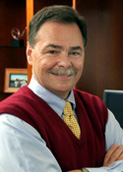 Fred Sanfilippo, MD, PhD |
Preserving medicine as a profession This past Monday, I had the privilege of addressing Emory University School of Medicine’s graduating class and their loved ones. I wanted to use my column this month to share my remarks with you and to ask you to join me in wishing continued success to these and all our other graduates throughout the health sciences. To read more about Monday’s commencement activities, please see the article below. Dean Lawley, faculty, guests, and most important, our graduates and their family, friends, and loved ones who helped make this day possible--I am pleased and honored to participate in two of the most important traditions in the profession of medicine--hooding new physicians and reciting the Hippocratic Oath. These ceremonies have deep historic traditions. The hooding of graduates is of English origin dating back to the 13th century, while the Hippocratic Oath is of Greek origin and much older, dating to the fifth century B.C. These ceremonies are always inspirational, and they always remind me of when I received my own hood and took the Hippocratic Oath, more than 30 years ago. Like you today, I was full of plans and dreams. And despite setbacks and surprises (as Bernie Marcus spoke of this morning), I’ve been very fortunate to have had so many rewarding activities over my career as a physician-scientist and an academic leader. I wish the same good fortune to each of you as you make the transition from medical student to the next phase in your lifelong journey of learning and teaching as physicians. And as you think about your own hopes and aspirations for the future, in this most exciting time of change and discovery in medicine, I’d like to leave you with a simple thought and charge: it is really up to you to preserve medicine as a profession. As many of you know, at the beginning of the last century, medicine in the United States was transformed from a trade (based on skill and taught by apprenticeship) into a profession (based on knowledge and taught as a science by university faculty). And now, at the beginning of this century, we are facing a new challenge--the pressures that are transforming medicine from a profession into a business, based on financial return and competition for market share. So with today’s ceremonies, in addition to celebrating your achievements, we ask that you renew your commitment to medicine as a profession and therefore your commitment to both knowledge and education. Remember that the best physicians are those who know what they don’t know and who are committed to educating others--their peers and their patients. So take every opportunity to learn as well as to teach. You are our best and brightest, and we are fortunate that the future of the medical profession is in such good hands. On behalf of the faculty and staff of the Woodruff Health Sciences Center, I offer my congratulations to each of you and very best wishes for your continued success. Please send comments or feedback to evphafeedback@emory.edu. |
|||
Preserving medicine as a profession Commencement 2008 ECLH celebrates centennial Bridge symbolizes ties to VAMC Staying on track |
||||
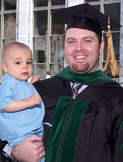 Nick Kelly, MD, with Jackson 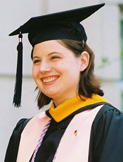 Amy Cupples, BSN  Edna Nore, MPH |
Commencement 2008
Amid festive gatherings filled with sleepy babies, proud grandmothers, gowned faculty, and relieved parents, the schools of medicine, nursing, and public health awarded degrees to almost 600 students during commencement exercises on Monday, May 12. In medicine, 112 graduates (including six MD/PhDs and 15 MD/MPHs) listened to speaker and Associate Dean for Public Policy Arthur Kellermann: "Life's persistent questions will no longer march up to you two by two," he said. "They will come at you like a howling mob." Kellermann paid tribute in his remarks to Health Students Taking Action Together, the group who campaigned vigorously to help save Grady Hospital. And all paid tribute to Executive Associate Dean William Eley, who received both the Papageorge Teaching Award and the Emory Williams Teaching Award. In the school's ceremony for health professions (formerly called allied health), 54 students received degrees in physical therapy (doctorate), medical imaging (bachelor's), and ophthalmic technology (master's). The speaker was Global Health VP Jeffrey Koplan, who urged the graduates to consider not just how their expertise is needed in Atlanta or the rest of the country but around the world. In nursing, where the day coincided with the birth in 1820 of Florence Nightingale, 181 received degrees ranging from BSNs to PhDs. Chancellor Michael Johns told the graduates that their Emory degree is both a blessing and a burden: "You know what excellence is, but now you have a special obligation. You're good, but we expect you to do better. You carry the Emory pedigree. You are our proof of principle." Nursing faculty member Sarah Freeman received the Emory Williams Teaching Award. In public health, 220 received MPH degrees (including 22 dual degrees) and 16 received PhDs. The graduates, 80% women, came from 39 states and 42 countries and ranged in age from 21 to 59. Speaker and faculty member Stan Foster, a veteran of smallpox eradication, had three words for the graduates: "Prevention, Prevention, Prevention." He said, "You've climbed Rollins Mountain. But there is no way to jump from mountain top to mountain top. Climbing a new mountain is hard work, but in doing that your passion will emerge." Public health faculty members Steven Culler, Michael Kutner, and Paul Weiss received the Emory Williams Teaching Award, the Thomas Sellers Award, and the Student Government Professor of the Year Award, respectively. |
|||
 Edward Davis Edward Davis Luther Fischer Luther Fischer |
Emory Crawford Long celebrates centennial The official founding date is October 21, but Emory Crawford Long Hospital has already begun celebrating its 100th anniversary. A historic exhibit is now on view in the atrium of the medical office tower, and walking tours of the hospital are being offered on three Wednesdays next month (June 4 at 10:30 a.m., June 11 at 1:30 p.m., and June 25 at 3:30 p.m.). The tours are being led primarily by Ren Davis, a project manager in Emory Healthcare, author of Caring for Atlanta: A History of Emory Crawford Long Hospital, and grandson of one of the hospital's founders. Dr. Edward Davis and his former student, Dr. Luther Fischer, founded the hospital's forebear, the 26-bed Davis-Fischer Sanatorium, on Crew Street near present-day Turner Field in 1908. Three years later, they moved the facility to its present site in midtown, opening an 85-bed building on Linden Avenue that now houses the hospital's museum. Davis and Fischer exhausted their own personal funds and took out a loan to complete this facility. The hospital was rechartered as a nonprofit hospital in 1931 and renamed in honor of the Georgia physician who discovered sulfuric ether as an anesthetic. Fischer deeded the hospital to Emory in 1939, and Emory became the hospital's proprietor when Fischer died in 1953. For more information about anniversary-related activities, see website. For a detailed timeline about the hospital's history, see pdf. |
|||
|
Bridge symbolizes ties to VAMC A new 210-foot-long suspension bridge over Peachtree Creek in Lullwater Preserve provides easy pedestrian access between the Emory campus and VA Medical Center. The $177,000 structure was constructed to be minimally disruptive to the natural environs and touches ground in only two places on either side of the creek, at the foundations of its 27-foot-tall towers and cable anchors. It replaces a previous bridge that was removed in the early 1990s. The bridge symbolizes a long-time partnership between Emory and the VAMC, where virtually all physician staff are Emory faculty. Its completion happens to coincide with the federal VA's National Research Week (see website for information about VA-sponsored research). For examples of research collaboration between Emory and the Atlanta VAMC, see pages 22-25 in a pdf of the health sciences center's 2007 community services report. |
|||
|
Staying on track while moving full speed ahead This is part of a series of profiles of people throughout the Woodruff Health Sciences Center. Barbara Schroeder describes her job in the medical school as like that of an air traffic controller. She constantly prioritizes and reprioritizes, making sure the planes arrive where they were headed, safely, on time--and, of course, within budget. |
|||
| Noteworthy | ||||
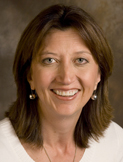 Dallis Howard-Crow Dallis Howard-Crow |
- New appointments • Dallis Howard-Crow has been named chief human resources officer for Emory Healthcare, effective June 23. Howard-Crow has more than 25 years of health care and corporate HR experience, most recently from Methodist Health Services Corporation in Peoria, IL, where she was senior VP. There she had responsibility for a variety of clinical and operational departments, including HR. Under her leadership, Methodist earned Magnet nursing designation (the nursing profession’s highest achievement) in 2004 and in 2006 was the first Illinois hospital in three years to be presented the Lincoln Gold Award for Quality. Howard-Crow also has 10 years' experience at Denver-based HCA-Health One, a six-hospital system, most recently as VP of HR. |
|||
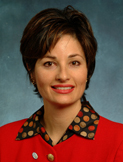 Margery McKay Margery McKay |
• Margery (Maggi) McKay, senior AVP for development for the medical school, will provide leadership as interim VP for development for health sciences following the departure of Phil Hills, who leaves Emory at the end of this month after nine years to serve as executive vice president of the Lance Armstrong Foundation. |
|||
| - Cover stories | ||||
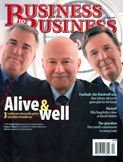 |
• Emory Healthcare CEO John Fox was one of three Atlanta health care CEOs featured in a cover story in the April issue of Business to Business magazine, discussing challenges and opportunities facing metro Atlanta hospitals over the next five years. As in other states, the industry has a high profile in Georgia, with an economic impact of more than $31 billion and a job force of more than 137,000. In conjunction with the article, Fox joined the CEOs of WellStar Health System and Piedmont Healthcare for a breakfast roundtable attended by more than 225 Atlanta business leaders to discuss the keys to running a successful and financially sound hospital. When asked about the ultimate measuring stick of a hospital’s success, whether it be profitability, number of patients, or bottom-line financial performance, Fox answered: “First, second, and third, it’s quality." |
|||
 |
• Lynne Ometer and her team in Emory Healthcare's division of food and nutrition services were featured in the cover story of the April issue of Food Management magazine. The six-page article details the process through which Ometer and her colleagues integrated food services throughout Emory Healthcare facilities over the past decade. Among other improvements over this time period, including making points of service more people-friendly, the system today produces about twice the number of meals it did 10 years ago with 7% less staff. |
|||
| - Events |
||||
• Third Annual Ethics and Compliance Symposium, May 29, 8:30 a.m. to noon, Cox Hall Ballroom. Attorney Alan Milstein will discuss lessons learned from the Jesse Gelsinger case at the University of Pennsylvania, and regulatory compliance administrator Ernest Prentice will discuss the future of IRBs. For more information, please call 404-727-2398. To register, visit website. |
||||
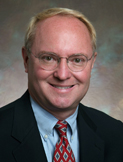 Kenneth Thorpe |
• Fighting Chronic Disease: The Missing Link in Health Care Reform, June 5, Washington, D.C., a half-day bipartisan health policy forum co-hosted by the Partnership to Fight Chronic Disease and Emory's Institute for Advanced Policy Solutions, which is directed by Kenneth Thorpe (public health). For more information about the forum, contact, Tarvis Thompson, tthomp8@emory.edu. For more information about the institute, see article. For a recent opinion piece by Thorpe about future prospects for health care reform, see article. |
|||
- Awards |
||||
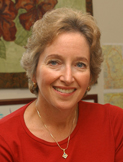 Karen Glanz Karen Glanz |
Emory was well represented again this year among winners and finalists in the Atlanta Business Chronicle's annual Healthcare Heroes awards, published in the May 9 issue.
|
|||


